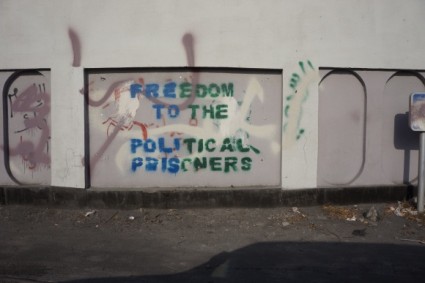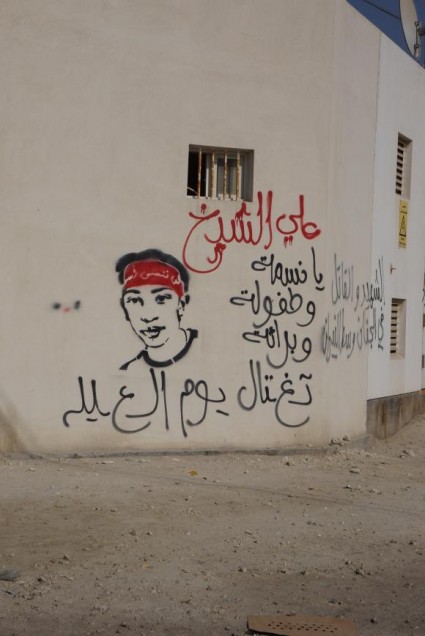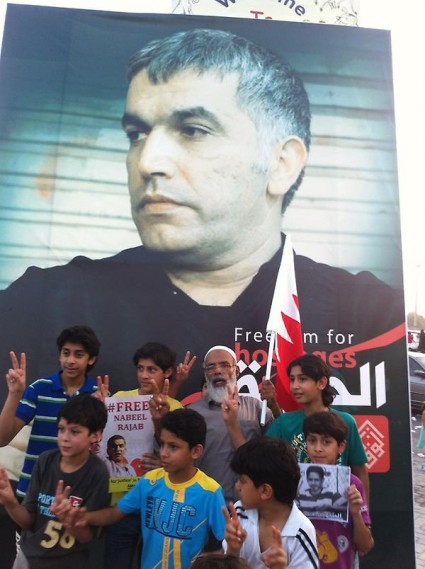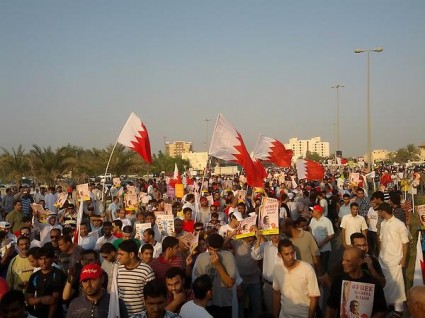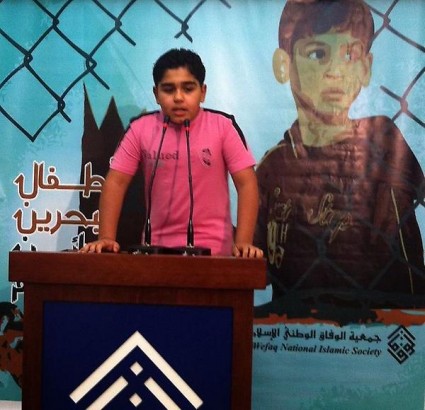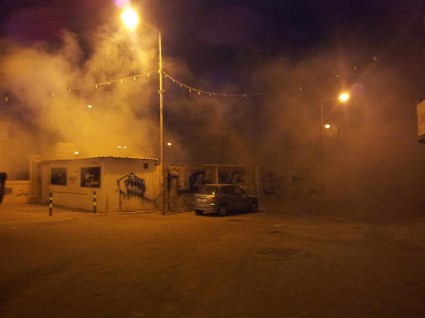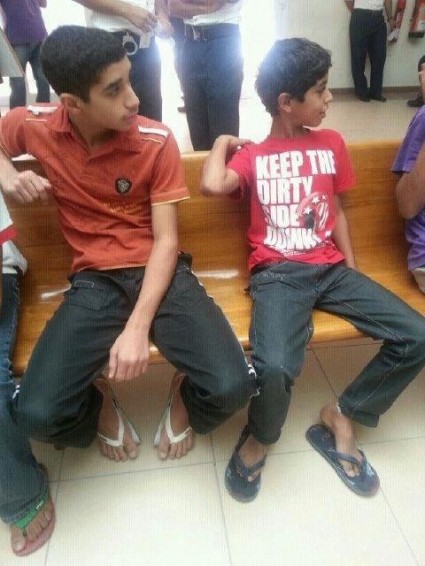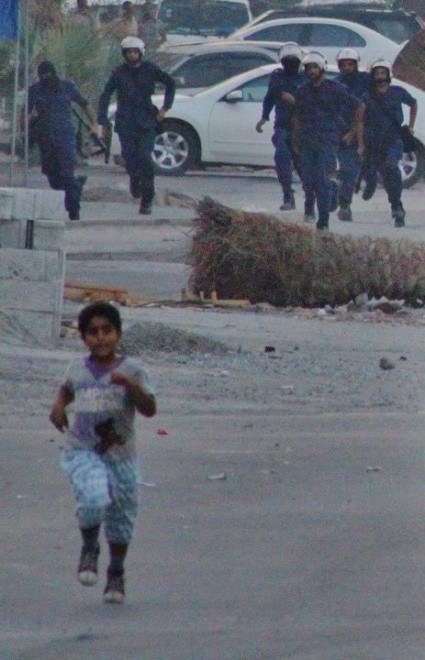Posts from — August 2012
Jabalat Habashi Resists in The Flames
August 31, 2012 No Comments
Puri – Marching as Symbols of Sacrifice
August 31, 2012 No Comments
Bahrain Liberty and Democracy March and Rally – fast-forward
August 31, 2012 No Comments
Freedom To The Political Prisoners
August 31, 2012 No Comments
Hamad, Killing the Young Ensures Your Doom
August 31, 2012 No Comments
Orchestrating a Moment for Freedom
Sept 4. Bahraini Court Verdicts Could Be Transformative
31 August, 2012 – Human Rights First
Washington, DC – Human Rights First today said that expected Sept. 4 verdicts in three closely watched Bahraini court cases could make Tuesday a potentially transformative day for human rights in the Kingdom. Among those who will learn their fate on Tuesday are 13 leading dissidents, 28 medics and Zianab Al Khawaja, all prosecuted for exposing the truth behind the Bahrain regime’s false claims of reform.
“It’s hard to remember a day that could – if the right decisions are made – change the human rights picture so radically in Bahrain, “said Human Rights First’s Brian Dooley. “If the Bahrain regime has the vision and courage to release these people it could be a game changer.”
Appeal verdicts are expected in the cases of 13 of Bahrain’s most prominent dissidents who, after a show trial in military court, were originally sentenced in June 2011 to terms of between two years and life in prison. That group includes leading human rights activist Abdulhadi Al Khawaja, founder of the Bahrain Center for Human Rights, as well as Hassan Mshaima’, ‘Abdelwahab Hussain, Dr ‘Abdel-Jalil al-Singace, Mohammad Habib al-Miqdad, Abdel-Jalil al-Miqdad, Sa’eed Mirza al-Nuri, Mohammad Hassan Jawwad, Mohammad ‘Ali Ridha Isma’il, Abdullah al-Mahroos, ‘Abdul-Hadi ‘Abdullah Hassan al-Mukhodher, Ebrahim Sharif, Salah ‘Abdullah Hubail al-Khawaja.. The men were convicted of various charges, including “setting up terror groups to topple the royal regime and change the constitution.” In May 2011, Dooley was denied entry at the courtroom when he arrived to observe the 13 men’s military trial.
He was at an early court hearing for the 28 medics in March 2012. The 28 medical professionals awaiting verdicts on Tuesday include nurses, consultants, surgeons and ambulance drivers. The charge sheets against them include inciting hatred against the regime and taking part in an illegal gathering. The medics dispute the charges and have maintained that they were just doing their jobs as medics. One of the medics, Dr Nabeel Tammam, told Human Rights First, “They have no case against the medics, all confessions were taken under torture.”
In addition to treating those injured in the uprising, Dooley notes that the medics were likely targeted by the regime for telling the world what was happening in Bahrain or for being perceived as associated with the protests. Another 20 medics who were sentenced by the military court in September 2011 had their appeal verdicts announced on June 14.
On Tuesday, Zainab Al Khawaja will also hear the verdict against her for peaceful protesting against the regime. She is currently in detention awaiting the decision. …source
August 31, 2012 No Comments
Free the Prisoners Hamad
August 31, 2012 No Comments
Olive Branches and Rebukes – Ayatollah Khamenei to President Obama: Change Your Behavior
Ayatollah Khamenei to US: Change your Behavior
Ali Rizk – Moqawama Specials
The alarm expressed by “Israel” over UN Secretary General Ban Ki-Moon’s participation in the NAM summit in Tehran is not merely related to Ban’s engagement with high ranking Iranian officials. Rather “Israeli” premier Benjamin Netanyahu was so angry with Ban’s participation, describing it as “a big mistake”, because he knows that it means Western, and specifically US engagement with Tehran. According to certain Iranian media websites, Ban decided to head to Iran upon the insistence of former US assistant secretary of state Jeffrey Feltman, who was recently appointed as Ban’s undersecretary for political affairs, and who accompanied the UN chief on this trip. Ban’s meeting with the Iranian supreme leader Ayatollah Sayyed Ali Khamenei actually does fit in with the Obama style approach towards the Islamic Republic.
Since coming into office, Obama has sought to communicate directly with Ayatollah Khamenei having sent letters addressed directly to the leader of the Islamic Revolution in Iran. The “traces of the American administration” were also evident in Ban’s statements. At a time where US officials worry about a possible “Israeli” suicide mission to strike Iran, which would prove catastrophic for US interests and for “Israel” itself, Ban called on the Islamic Republic to show cooperation regarding its peaceful nuclear program. MORE IMPORTANTLY the UN chief urged the Islamic Republic to tone down its anti-“Israeli” rhetoric saying:
“I strongly reject threats by any member state to destroy another or outrageous attempts to deny historical facts such as the Holocaust.”
At a time where there are elevated fears in Washington about Netanyahu going ahead with a possible military adventure, one of the ways in which the Obama administration could use leverage against Netanyahu would be to have Iran’s leadership reiterate that its nuclear program is indeed for peaceful purposes and at the same time tone down its anti-“Israeli” approach.
On the other hand Ban made reference to Iran’s significant weight as a regional player which could play a role in putting an end to the crisis in Syria. Here the US can be seen as showing its recognition of Iran as an indispensable regional player. But taking into account what was mentioned above regarding “Israel”, Washington appears to be saying that it has no problem with Iran playing a major regional role if Tehran makes some adjustments to its stances towards “Israel”. Put in another way : “change your behavior, only with regards to “Israel””.
Then came the response of the Iranian supreme leader. In a speech opening the NAM summit Ayatollah Khamenei once again underscored that his country was against weapons of mass destruction describing their use as “an unforgivable sin”. But with respect to “Israel” he made it clear that it was “Israel” that was the source of instability and the hostile party with its policies against the Palestinians and its ongoing threats to launch war on Iran, referring to “Israeli” leaders as “bloodthirsty wolves”. But what was most significant was what he said towards the end of his speech. In response to the calls to change behavior towards “Israel”, Ayatollah Khamenei told Washington to do just the same: change American behavior and policies towards “Israel”.
The Iranian supreme leader said that “Israel” was causing the US a headache and that the ongoing support for “Israel” was becoming too costly for the United States. He also said that American officials should “show courage and opt for the referendum solution” regarding Palestine and stop what he called the US “astronomical spending” on “Israel”.
These statements by Ayatollah Khamenei do indeed show signs of a new world order which the supreme leader also referred to in its speech. In fact this new world order and Iran’s role in it became evident ever since Obama, who belongs to the realist school of thought, came to the White House advocating a new approach towards Iran realizing that the US is no longer in a position to continue hostile policies towards certain countries.
The US president however, has bowed down to “Israeli” pressures so far and has set records in military assistance to the Israeli government. This “bowing down to “Israel”” will only cost the US more as the Islamic awakening in the region signals the beginning of a period where the people are the source of legitimacy. And the stance of the people towards “Israel” is no secret to anyone. …source
August 31, 2012 No Comments
Saudi Arabia: The Arab Woman; The Muslim Country
In a satirical poem titled “When,” posted on Arabic reformist websites including www.aafaq.org , reformist Saudi author and journalist Wajeha Al-Huwaider lamented what she regards as the conditions in the Arab world. In the introduction to this poem, she wrote: “‘When’ is an ode to the troubles of the Arab citizen. Both men and women participated in its [writing], and it is still open to additions. This ode will be hung on the walls of the palaces of the Arab rulers, [1] so feel free to add you contributions.”
Saudi Arabia: The Arab Woman; The Muslim Country
31 August – by from aafaq.com – Poetry by Wajeha Al-Huwaider
The following are excerpts from the poem “When”:
“When you cannot find a single garden in your city, but there is a mosque on every corner – you know that you are in an Arab country…
“When you see people living in the past with all the trappings of modernity – do not be surprised, you are in an Arab country.
“When religion has control over science – you can be sure that you are in an Arab country.
“When clerics are referred to as ‘scholars’ – don’t be astonished, you are in an Arab country.
“When you see the ruler transformed into a demigod who never dies or relinquishes his power, and whom nobody is permitted to criticize – do not be too upset, you are in an Arab country.
“When you find that the large majority of people oppose freedom and find joy in slavery – do not be too distressed, you are in an Arab country.
“When you hear the clerics saying that democracy is heresy, but [see them] seizing every opportunity provided by democracy to grab high positions [in the government] – do not be surprised, you are in an Arab country…
“When monarchies turn into theocracies, and republics into hybrids of monarchy and republic – do not be taken aback, you are in an Arab country.
“When you find that the members of parliament are nominated [by the ruler], or else that half of them are nominated and the other half have bought their seats through bribery… – you are in an Arab country…
“When you discover that a woman is worth half of what a man is worth, or less – do not be surprised, you are in an Arab country…
“When you see that the authorities chop off a man’s hand for stealing a loaf of bread or a penny, but praise and glorify those who steal billions – do not be too surprised, you are in an Arab country…
“When you are forced to worship the Creator in school and your teachers grade you for it – you can be sure that you are in an Arab country…
“When young women students are publicly flogged merely for exposing their eyes – you are in an Arab country…
“When a boy learns about menstruation and childbirth but not about his own [body] and [the changes] it undergoes in puberty – roll out your prayer mat and beseech Allah to help you deal with your crisis, for you are in an Arab country…
“When land is more important than human beings – you are in an Arab country…
“When covering the woman’s head is more important than financial and administrative corruption, embezzlement, and betrayal of the homeland – do not be astonished, you are in an Arab country…
“When minorities are persecuted and oppressed, and if they demand their rights, are accused of being a fifth column or a Trojan horse – be upset, you are in an Arab country…
“When women are [seen as] house ornaments which can be replaced at any time – bemoan your fate, you are in an Arab country.
“When birth control and family planning are perceived as a Western plot – place your trust in Allah, you are in an Arab country…
“When at any time, there can be a knock on your door and you will be dragged off and buried in a dark prison – you are in an Arab country…
“When fear constantly lives in the eyes of the people – you can be certain that you are in an Arab country.”
Endnotes: [1] This is an allusion to the Seven Mu’allaqat, famous sixth century odes which, according to Arab legend, were hung in pre-Islamic times on the walls of the Qa’ba in Mecca.
August 31, 2012 No Comments
Will any escape the chains of their ‘Cold War’ Masters?
August 31, 2012 No Comments
This many kids can’t be wrong – Free Rajab you nasty old King!
August 31, 2012 No Comments
Hamad hear the sound of your impending Doom!
August 31, 2012 No Comments
Bahrain regime engages in sytematic abuse through rape, murder, false imprisonment of children – As Signator to UN Children Rights Convention, renders it Bull-shit
Bahrain had signed the UN Children’s Rights Convention in 1992 in which every person under the age of 18 is considered a child. However, The Bahraini law states that those under the age of 15 are considered children.
Bahraini children victims of murder, arrest, torture, and harassment
31 August, 2012 – ABNA.com
(Ahlul Bayt News Agency) – Bahrain had signed the UN Children’s Rights Convention in 1992 in which every person under the age of 18 is considered a child. However, The Bahraini law states that those under the age of 15 are considered children.
Ali Al-Shleikh died at 14 years of age. Abdul Hussein died at 6 years of age due to suffocation from tear gas thrown into his home.
In Both cases the Bahraini government committed flagrant violations against children. A new statistic shows that the children under 18 who have been killed number 11.
This does not include the infants that have been killed due to the tear gas, and who number 30 infants. Sajida Faisal died at age 5 days, and Yahia Youssef Ahmad died at age one month.
The Bahraini Center for Human Rights concluded that there were at least 45 incidents of abortion that were caused by the tear gas as well, in addition to numerous cases of abnormalities among newborns which sheds light on the type of substances present in the tear gas.
Several professionals and activists have document and reported cases of child arrest, sexual abuse, verbal abuse, beatings, and torture after being charged with public rallying made up of five or more people with the intent of public unrest or committing crimes according to Article 179 of the Penal Code.
Children between 15 and 18 were especially subjected to torture and treated like adults in the police stations and investigation rooms.
This article has been condemned by the Basioni report for holding individuals accountable according to a perceived intent. The public prosecutor claimed, in a statement it issued in December 2011, that charges based on this article will be dropped since it coincides with the freedom of expression.
Some examples of such cases are: Abdul Karim Hasan, who was detained for 12 days and was beaten and verbally and physically abused. Ali Hasan Ali (Youngest detainee in the Bahraini prisons) who was detained for 25 days on charges of rallying and committing crimes. Ali Al-Sankis who was photographed naked and blackmailed with the produced photos. …source
August 31, 2012 No Comments
All Members shall refrain from the threat or use of force against territorial integrity or political independence of any other state
Will Iran be US’s Melos?
By Peter Jenkins – Asia Times – 23 August, 2012
One of the most depressing aspects of all the talk about Israel or the United States destroying Iran’s nuclear facilities (and much else besides, no doubt) is the near absence of any reference to international law. Even so distinguished an expert as Anthony Cordesman seems to take it for granted that there will be no legal impediment to the US attacking Iran if a credible threat of an attack fails to intimidate Iran into making the concessions required to pacify Israel.
In my country, Britain, on February 20, 2012, members of the House of Commons spent five hours debating whether the use of force against Iran would be “productive” without dwelling more than cursorily on the legal aspects of the question.
How is one to account for this blind spot? Are ignorance and oversight to blame, or has respect for international law gone out of fashion?
It’s hard to believe that anyone who has policy-making responsibilities that involve other states, or who takes a professional interest in such policy-making, can be unaware of what the bed-rock of the post-1945 international system has to say about war-making. The United Nations Charter was drafted to be understood by a much wider readership than international law-focused lawyers. Paragraphs 3 and 4 of Article 2 of the Charter could hardly be clearer:
3. All Members shall settle their international disputes by peaceful means in such a manner that international peace and security and justice are not endangered.
4. All Members shall refrain in their international relations from the threat or use of force against the territorial integrity or political independence of any other state, or in any other manner inconsistent with the Purposes of the United Nations.
Read in conjunction with Article 1, which spells out the Purposes of the UN, and Articles 39 to 50, which detail how the Security Council should react to “Threats to the Peace, Breaches of the Peace and Acts of Aggression”, these paragraphs suggest that the use of force by one state against another state is only lawful if the Security Council authorizes it.
An exception to this rule can be found in Article 51 of the Charter: the right of self-defense if an armed attack occurs against a member. But this is irrelevant to the Iranian nuclear dispute at the present juncture, for reasons set out most recently by Dan Joyner.
These points are so easily understood, and so clearly central to any proposal to attack Iran for its nuclear activities, that ignorance and oversight can hardly explain their widespread absence from the public debate, or the conspicuous failure of Western politicians to inject a reminder of the legal dimension into that debate. …more
August 30, 2012 No Comments
Afghanistan, Where Empires Go To Die
How Quickly Will the U.S. Leave Afghanistan?
The Best Laid Plans – Losing It in Washington
By Tom Engelhardt – 26 August, 2012
In the wake of several deaths among its contingent of troops in a previously peaceful province in Afghanistan, New Zealand (like France and South Korea) is now expediting the departure of its 140 soldiers. That’s not exactly headline-making news here in the U.S. If you’re an American, you probably didn’t even know that New Zealand was playing a small part in our Afghan War. In fact, you may hardly have known about the part Americans are playing in a war that, over the last decade-plus, has repeatedly been labeled “the forgotten war.”
Still, maybe it’s time to take notice. Maybe the flight of those Kiwis should be thought of as a small omen, even if they are departing as decorously, quietly, and flightlessly as possible. Because here’s the thing: once the November election is over, “expedited departure” could well become an American term and the U.S., as it slips ignominiously out of Afghanistan, could turn out to be the New Zealand of superpowers.
You undoubtedly know the phrase: the best laid plans of mice and men. It couldn’t be more apt when it comes to the American project in Afghanistan. Washington’s plans have indeed been carefully drawn up. By the end of 2014, U.S. “combat troops” are to be withdrawn, but left behind on the giant bases the Pentagon has built will be thousands of U.S. trainers and advisers, as well as special operations forces to go after al-Qaeda remnants (and other “militants”), and undoubtedly the air power to back them all up.
Their job will officially be to continue to “stand up” the humongous security force that no Afghan government in that thoroughly impoverished country will ever be able to pay for. Thanks to a 10-year Strategic Partnership Agreement that President Obama flew to Kabul to seal with Afghan President Hamid Karzai as May began, there they are to remain until 2020 or beyond.
In other words, it being Afghanistan, we need a translator. The American “withdrawal” regularly mentioned in the media doesn’t really mean “withdrawal.” On paper at least, for years to come the U.S. will partially occupy a country that has a history of loathing foreigners who won’t leave (and making them pay for it).
Tea Boys and Old Men
Plans are one thing, reality another. After all, when invading U.S. troops triumphantly arrived in the Iraqi capital, Baghdad, in April 2003, the White House and the Pentagon were already planning to stay forever and a day — and they instantly began building permanent bases (though they preferred to speak of “permanent access” via “enduring camps”) as a token of their intent. Only a couple of years later, in a gesture that couldn’t have been more emphatic in planning terms, they constructed the largest (and possibly most expensive) embassy on the planet as a regional command center in Baghdad. Yet somehow, those perfectly laid plans went desperately awry and only a few years later, with American leaders still looking for ways to garrison the country into the distant future, Washington found itself out on its ear. But that’s reality for you, isn’t it? …more
August 30, 2012 No Comments
“The Mexican State, repressor of justice against EZLN support bases”
“The Mexican State, repressor of justice against EZLN support bases”
August 2012
San Cristobal de Las Casas, Chiapas, Mexico
August 23, 2012
Bulletin No 15
The Fray Bartolomé de Las Casas Human Rights Centre (Frayba), is concerned about the violations of due process against Francisco Sántiz López (hereinafter Francisco), Tzeltal indigenous support base of the Zapatista Army of National Liberation (BAEZLN), who is unjustly imprisoned in the State Centre for the Social Reintegration of the Sentenced No. 5 (CERSS No. 5) in San Cristobal de Las Casas, Chiapas.
The Judge of the First District Court of Federal Criminal Proceedings in the state of Chiapas, declared unfounded the instance of freedom through the disappearance of information[i], in favour of Francisco, in an agreement published on 17 August this year, referring among other arguments, to the fact that at the time of his formal arrest and imprisonment, testimonies were taken into account from witnesses who reported that Francisco was in the company of armed men, which is insufficient evidence to consider that the data have disappeared[1]. It is clear that the judge failed to appreciate that the eight witnesses stated explicitly that Francisco was not carrying any weapons, the crime of which he is accused.
It is important to note, that in the Detention Order, the First Judge of the Federal Districts in the state of Chiapas did not give sufficient value to the testimonies: of the authorities nor of the witnesses who reported that the arrest took place in the county seat of Tenejapa, and that Francisco was not in Banavil, municipality of Tenejapa, at the time the attacks occurred; also the fact that the firearm was “secured” and delivered, along with 5 other weapons, to the court of indigenous peace and conciliation, by the people of this community, in addition he did not make any inquiries which suggested that Francisco was carrying the aforementioned firearm.
Currently, Francisco Sántiz is accused of the federal crime of carrying a firearm for the exclusive use of the Army and Armed Forces, equivalent to the crimes of murder and aggravated assault; on 22 March, the criminal action was terminated, through the withdrawal of the public ministry of local jurisdiction.
Frayba believes that during the arrest and prosecution of Francisco, the following rights have been violated: personal liberty, presumption of innocence, judicial guarantees, a fair trial and legal protection. The number of rights violated is evidence of the persecution of Sántiz Lopez
for the political work he has been performing in the Highlands of Chiapas, so there is a justified fear that the First District Court of Federal Criminal Proceedings in the state of Chiapas could issue a guilty conviction against Francisco.
In the view of this Human Rights Centre, the Mexican state is using the system of law enforcement and justice administration to criminalize the support bases of the Zapatista Army of National Liberation, because they are disturbed by the progress in the right to self-determination through Zapatista autonomy, based on the Accords of San Andrés and the international benchmarks: ILO Convention 169 and the UN Declaration on the Rights of Indigenous Peoples.
Finally we ask individuals, communities, groups and solidarity organizations at a national and international level, to be attentive to the actions of the First District Court of Federal Criminal Proceedings in the state of Chiapas, and to join the actions taking place in the fourth phase of the Worldwide Campaign for the freedom of Francisco Sántiz Lόpez and Alberto Patishtán, “For 9 months: 9 Days of Action to Break Down the Prison Walls”, from Monday 27 August to 4 September this year, called by the Movement for Justice in El Barrio from New York, USA. …source
August 30, 2012 No Comments
Obama’s legacy – ‘Harvard Neoliberals are taught to outsource the ugly, dirty work America doesn’t talk about in public’
How two administrations and both parties made illegality the American way of life
Impunity at home, rendition abroad
16 August, 2012 – by Alfred W. McCoy – La Monde
After a decade of fiery public debate and bare-knuckle partisan brawling, the United States has stumbled toward an ad hoc bipartisan compromise over the issue of torture that rests on two unsustainable policies: impunity at home and rendition abroad.
President Obama has closed the CIA’s “black sites,” its secret prisons where American agents once dirtied their hands with waterboarding and wall slamming. But via rendition — the sending of terrorist suspects to the prisons of countries that torture — and related policies, his administration has outsourced human rights abuse to Afghanistan, Somalia, and elsewhere. In this way, he has avoided the political stigma of torture, while tacitly tolerating such abuses and harvesting whatever intelligence can be gained from them.
This “resolution” of the torture issue may meet the needs of this country’s deeply divided politics. It cannot, however, long satisfy an international community determined to prosecute human rights abuses through universal jurisdiction. It also runs the long-term risk of another sordid torture scandal that will further damage U.S. standing with allies worldwide.
Perfecting a new form of torture
The modern American urge to use torture did not, of course, begin on September 12, 2001. It has roots that reach back to the beginning of the Cold War and a human rights policy riven with contradictions. Publicly, Washington opposed torture and led the world in drafting the United Nation’s Universal Declaration of Human Rights in 1948 and the Geneva Conventions in 1949. Simultaneously and secretly, however, the Central Intelligence Agency began developing ingenious new torture techniques in contravention of these same international conventions.
From 1950 to 1962, the CIA led a secret research effort to crack the code of human consciousness, a veritable Manhattan project of the mind with two findings foundational to a new form of psychological torture. In the early 1950s, while collaborating with the CIA, famed Canadian psychologist Dr. Donald Hebb discovered that, using goggles, gloves, and earmuffs, he could induce a state akin to psychosis among student volunteers by depriving them of sensory stimulation. Simultaneously, two eminent physicians at Cornell University Medical Center, also working with the Agency, found that the most devastating torture technique used by the KGB, the Soviet secret police, involved simply forcing victims to stand for days at a time, while legs swelled painfully and hallucinations began.
In 1963, after a decade of mind-control research, the CIA codified these findings in a succinct, secret instructional handbook, the KUBARK Counterintelligence Interrogation manual. It became the basis for a new method of psychological torture disseminated worldwide and within the U.S. intelligence community. Avoiding direct involvement in torture, the CIA instead trained allied agencies to do its dirty work in prisons throughout the Third World, like South Vietnam’s notorious “tiger cages.” …more
August 30, 2012 No Comments
al Khalifas, Abusers of Children – “My brother was heading to the grocery when the police arrested him ” – a brother of a detained kid
August 30, 2012 No Comments
Rioting Automobile attacked by Bahrain Security Forces with CS Gas – A little excessive Timoney – you think?
August 30, 2012 No Comments
Bahrain Regime ‘Child Trials’ intended to terrorise the families and Villages of the ‘Kidnapped’
Bahrain: Trialing Children with Political Charges and Fears of Abuse
Bahrain Youth Society for Human Rights- 30 August, 2012
The Bahrain Youth Society for Human Rights (BYSHR) expresses its great concern regarding the local authorities’ arrest of children who are less than 16 years of age on charges of participating in protests and accusing them of criminal charges.
The local authorities arrested S. Ali Mustafa Al-Muhafdha – 16 years old – on 14 June and he was accused of “assembling, possession of Molotov and attacking security patrols”.
According to the information received by the BYSHR from the S. Ali’s family, he suffers from very poor health and the officials at the “Dry Dock Prison” refuse to transfer him to a specialized doctor.
In July 2012, the local authorities arrested Mohammed Abbas Al-Mulani – 16 years old –Mohsen Mohammed Al-Arab – 13 years old – Mirza Abdul-shaheed Mirza – 12 years old – and they were accused of “criminal arson”.
The judge refused to release them and kept Al-Arab and Mirza in juvenile prison, and as to Al-Mulani he was transferred to “Dry Dock Prison”.
The local authorities accused these children of charges related to the political situation in the country and especially during the recent escalation of protests in Bahrain.
The BYSHR fears that children are being ill-treated given the past mistreatment the BYSHR had monitored before towards those accused in cases related to the political situation in the country, and emphasizes that the judiciary is not independent or unbiased in dealing with such cases.
The Bahrain Youth Society for Human Rights (BYSHR) demands the authorities to immediately release the children and to stop all kinds of arbitrary arrests of children and accusing them of political charges, and to independently and objectively investigate the claims of mistreatment in prison. …source
August 30, 2012 No Comments
US State Department: Syria Regime Change Must Be ISO Certified
U.S. training opposition how to administer ‘liberated’ Syrian towns
By Jill Dougherty – CNN
As more areas in Syria slip from control of the Syrian military, the United States is training local opposition members how to run a local government free from the grip of the Assad regime.
The State Department says it is running “training programs” for the members of opposition local coordinating councils in “liberated” areas who are beginning to re-establish civilian authority. The programs help them on issues of civil administration, human-rights training and other services.
The council members are learning “the kinds of things that they might need from the international community as they begin to rebuild their towns,” State Department spokeswoman Victoria Nuland said in her Wednesday briefing.
“They’re asking for help in how to budget. They’re asking for help in how to keep utilities running. How to ensure that the institutions of the state that, you know, provide services to the population, come back up and running. So we are open to supporting all of those kinds of needs,” she explained.
Nuland called it a “first round” of training, tailored to help form a nascent democratic society, even before President Bashar al-Assad is gone.
“It also gives us an opportunity,” she said, “to talk to them about inclusion and protection of minorities and all those things.” The first step is to assess the need, she explained. Training could get more detailed as the opposition requests what it needs from the international community.
Concerned for the security of the new administrators, State Department officials are reluctant to provide details of the training programs, but Nuland said the department is running the programs outside of Syria for those who can exit and return to Syria. For those who remain inside Syria, there are what she called “pretty extensive contacts.”
In addition, the department runs programs in Istanbul that train Syrian student and women leaders, as well as members of the media, in areas like justice and accountability.
Just how much of Syria is out of regime control is unclear. Nuland said it is a “mixed picture.”
“Great swaths” of the country have now been wrenched away from the regime in the north and the east and, increasingly, between some of the major towns, she said, but the fighting is intense in Aleppo, Damascus and some of the major population centers. …more
August 30, 2012 No Comments
Non-Aligned Movement Works Toward Solution to Syria Crisis
Can NAM Solve the Syrian Crisis?
By: Vijay Prashad – 30 August, 2012 – Al Akhbar
The 16th Non-Aligned Movement(NAM) summit opened on Sunday in Iran, with two-thirds of the world’s governments gathering in the Iranian capital. The NAM, since the 1980s, has been notably adrift. The debt crisis of the 1980s and the emergence of US primacy after the fall of the USSR at the end of the decade created a major crisis in the Global South. As the states of the South became to seek new alignments with the North out of economic needs or political ambitions, the agenda of the NAM fell by the wayside.
A combination of the cowboy wars led by the US and NATO (since the Bush administration) and the financial crisis (since 2007) alongside the economic rise of China and India has, however, given a boost to the aspiration of the NAM. The assertions of the BRICS (Brazil, Russia, India, China, South Africa) in the 2012 Delhi Declaration and the solidarity of the South at UNCTAD XIII in Doha in April of this year underlined the emergence of this new confidence.
The South’s mood has been further enlivened over the past five years by the emergence of popular movements that oppose neoliberalism and imperialism.
The South’s mood has been further enlivened over the past five years by the emergence of popular movements that oppose neoliberalism and imperialism. Their first stand was in Latin America, where the social and political movements were able to translate their popularity into the electoral domain. Most of the governments south of the Rio Grande River now oppose US primacy. In 2010, these Latin American states created the Community of Latin American and Caribbean States to undercut the formerly US-dominated Organization of American States.
The Arab Spring of 2011 offered further proof of the new confidence of the people of the ‘South’. Regimes that had given themselves over to pro-Western economic policies and opened their prisons to become the “black sites” of the War on Terror fell like ninepins. If the US had lost Latin America, it was now feared that it would lose the Arab world as well.
The Syrian Conundrum
NATO’s war in Libya and the Syrian crisis has afforded the US an opportunity to re-enter the Arab world as a major political player. This is what makes the Syrian crisis so central to the work of the NAM – apart, of course, from the more humane objective, which is to end the violence against the Syrian people. A cynical set of geopolitical calculations has made each side to this conflict take maximum positions, which rendered Kofi Annan’s mission to Damascus impossible. It is essential to create the political context for Lakhdar Brahimi, Annan’s successor, to be able to move an agenda.
One small part of the process to create the policy space for Brahimi has been proposed by Egypt – the Contact Group. The group will include all the major regional players: Egypt, Iran, Saudi Arabia, and Turkey. The NAM meeting was to be the setting to increase confidence for the Contact Group. If the NAM gives its endorsement to this Contact Group, it might be able to create a regional roadmap, allowing Brahimi and the UN to try and find a procedure to end the violence in Syria.
To have Iran and Saudi Arabia in the same process is both startling and a sign of hope.
Saudi Arabia will be represented by Prince Abdul-Aziz bin Abdullah, the son of King Abdullah. He is a popular prince who is the acting Deputy Foreign Minister. The entire top brass of Iran will be in attendance. To have Iran and Saudi Arabia in the same process is both startling and a sign of hope. Trapped by its own regional alignments, Iran has yoked itself firmly to the Assad regime. Saudi Arabia and Qatar have thrown in their lot with the rebellion, as has Turkey but with less fanfare. Such “unity” was not available at the Arab League summit in March that was held in Baghdad. The Saudis and the Qataris refused to send their top leadership because of their serious difference of opinion with both Syria and Iraq. Qatar sent minor bureaucrats and the Saudis sent their Arab League ambassador, Ahmed Qatan. No princes graced the occasion.
The government of Iraq’s Prime Minister Nouri al-Maliki had refused to stop Iranian aircraft from going through their airspace to Syria, and Baghdad was not willing to join in the isolation of Syria. The ground has shifted since March, and now the regional powers seem willing to see if cooperation is possible in order to bring stability to Syria and the region.
Turkey has, unfortunately, refused to come to the NAM meeting. It is not a NAM member, but it has been invited to attend as an observer. There is a precedent for this, since Australia will be in Tehran as the West’s listening post and has threatened to walk out if anything it deems inappropriate is said.
Foreign Minister Ahmet Davutoglu will not attend, and neither will the top leaders of his party in the government. Davutoglu, an academic, has developed a foreign policy that Hurriyet’s editor Yusuf Kanli called “no friends in the neighborhood” strategy. …more
August 30, 2012 No Comments
Under Intense International Criticism, Bahrain Regime Charges Murderous Policeman – conviction doubtful
Clearly the regime caved into international pressure as they prepare another ruse to placate the US State Department in a bid to preserve their friendly” relationship. The real crime lies in the MOI arming derelict police officers with lethal ammunition for ‘riot control’. The images of Hussam’s wounds clearly indicate the use of illegal, metalized shot – probably #5. Arming a largely illiterate, foreign national police force that has no tie or accountability to the communities they police, while not criminal, is a recipe for police violence with impunity. The MOI lays naked in hypocrisy with yet another ‘charge’ against police officers in a system that directs, rape, murder, torture and false imprisonment. The charade of compliance and pretense of accountability fools no one, except perhaps a complicit or at best a horribly naive US State Department. Phlipn – out.
Bahrain police charged over Shiite teenager death
30 August, 2012 – Lebanon Now
A Bahrain policeman has been charged over shooting dead a Shiite teenager when a group of protesters attacked security forces with petrol bombs, an investigator said.
The public prosecution “accused the policeman who opened fire on one of the attackers of premeditated murder,” said official, Nawaf Hamza, late on Wednesday, according to BNA state news agency.
He said the accused was released but has been banned from travel. His name and nationality have not been revealed.
But the public prosecution issued a later statement saying the charge against the policeman was “preliminary”, pending an investigation which so far shows the killing was “likely a case of self-defense.”
Sixteen-year-old Shiite Hussam al-Haddad died of his injuries on August 17, after police opened fire under attack from petrol bombs in Sunni-dominated Muharaq, close to the capital, according to the interior ministry.
The Sunni-ruled kingdom, home to the US Fifth Fleet and strategically situated across the Gulf from Iran, has continued to witness sporadic Shiite-led demonstrations mostly outside the capital since it crushed a pro-democracy uprising in March last year.
Hamza said the investigation revealed that police fired warning shots at 25 to 30 protesters attacking their patrol with petrol bombs, and that the defendant shot Haddad as he was about to hit him from close range with a Molotov cocktail.
The ministry had said at the time that security forces acted in self-defense.
The main Shiite opposition group, Al-Wefaq, condemned the “barbaric” attack on the teenager.
It posted pictures on its Facebook page of Haddad’s injuries, including shotgun wounds to his back and right arm. Bahraini security forces have widely used shotgun pellets and tear gas to disperse protesters.
…more
August 30, 2012 No Comments
UN Human Rights Rapporteurs lose credibility with every rhetorical call for regime action in Bahrain – Substance not empty words
U.N. Rapporteurs Call for Rights Compliance in Bahrain
28 August, 2012 – POMED
Last week, several U.N. human rights rapporteurs called on the Bahraini government to “comply with the rights to peaceful assembly and expression and immediately release those arbitrarily detained for exercising their legitimate freedoms.” Special Rapporteur on human rights defenders Margaret Sekaggya said “The sentencing of Nabeel Rajab represents yet another blatant attempt by the Government of Bahrain to silence those legitimately working to promote basic human rights.” Maina Kiai, the Special Rapporteur on freedom of peaceful assembly and association, contended that “the exercise of the right to freedom of peaceful assembly should not be subject to prior authorization from the authorities.”
Meanwhile, Bahraini human rights activist Maryam al-Khawaja wrote a letter to Egyptian president Mohamed Morsi to protest her recent barring and deportation from Egypt. In the letter, al-Khawaja decried “unlawful and hostile treatment [she] was subjected to at Cairo’s International Airport” after she was prevented from entering the country for “top secret reasons.” She was allegedly threatened with deportation back to Bahrain, where there is a warrant for her arrest. In April, al-Khawaja was also initially denied entry into Egypt, though she was let in after receiving the help of a lawyer and Egyptian activists.
In Bahrain, reports have emerged that the government ordered the transfer of Sunni cleric Adel Hassan al-Hamad from a prominent mosque to a less-prestigious position after al-Hamad described a land donation to the Catholic church as “an attempt to please Western nations.” The cleric warned that “silence in such matters could drag divine consequences” when urging his followers to act on the development. Justin Gengler examines al-Hamad’s actions and demotion in the larger context of the government’s “balancing act” with Bahraini Sunnis, and notes that dozens of Sunni cleric opposed the announcement of the church’s construction.
Finally, Abdulhadi Khalaf contends that Bahrain’s ability to sustain power through massive popular unrest stems from two factors: the United States’ reticence to pledge support to protesters like it did in Egypt and the composition of the Bahraini military which excludes “two-thirds of the indigenous population” from serving, and arrangement that allows “the Bahraini regime to remain confident that its military and security forces will remain loyal.” …source
August 29, 2012 No Comments
Bahrain Secuirty Forces Hunt Children in effort to Terrorise Villages
August 29, 2012 No Comments

